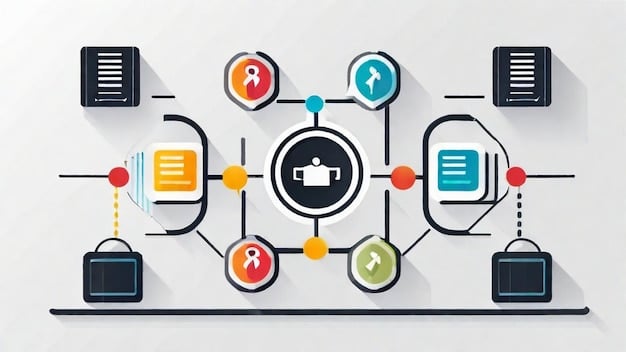New Federal Regulations: Data Privacy Updates for US Businesses in 2025

New Federal Regulations for Data Privacy are set to significantly impact businesses in the US by 2025, requiring them to update their data handling practices and enhance cybersecurity measures to comply with stricter standards and protect consumer information.
The digital landscape is constantly evolving, and with it, so are the regulations surrounding data privacy. As we approach 2025, businesses in the US need to be aware of the upcoming new federal regulations for data privacy and how these changes will impact their operations.
Understanding the Impetus Behind the 2025 Data Privacy Updates
The drive behind the 2025 data privacy updates stems from growing concerns about how personal information is collected, used, and shared in the digital age. These concerns are fueled by increasing data breaches, identity theft, and the misuse of consumer data.
Evolving Consumer Expectations
Consumers are becoming more aware of their data privacy rights and are demanding greater control over their personal information. This shift in consumer expectations is pushing lawmakers to enact stronger data protection laws that give individuals more say in how their data is handled.
Harmonizing with Global Standards
Many countries and regions, such as the European Union with its General Data Protection Regulation (GDPR), have already implemented comprehensive data privacy laws. The US is striving to align with these global standards to facilitate international data flows and ensure consistent protection for individuals’ data, regardless of where it is processed.
- Increased consumer trust and confidence in businesses.
- Reduced risk of data breaches and cyberattacks.
- Enhanced international competitiveness for US companies.
The new federal regulations are not just about compliance; they are about building a more trustworthy and secure digital environment for everyone. Businesses that embrace these changes can gain a competitive advantage by demonstrating their commitment to protecting consumer data.

Key Provisions of the New Federal Regulations
The 2025 data privacy updates are expected to introduce several key provisions that will reshape how businesses handle personal data. These provisions aim to enhance transparency, accountability, and individual rights.
Data Minimization and Purpose Limitation
The regulations will likely emphasize the principles of data minimization and purpose limitation. This means that businesses should only collect data that is necessary for a specific purpose and should not use the data for any other purpose without obtaining explicit consent.
Enhanced Individual Rights
Individuals will likely be granted enhanced rights over their personal data, including the right to access, correct, and delete their information. Businesses will need to establish processes for handling these requests in a timely and efficient manner.
The regulations are likely to impose stricter requirements for obtaining consent to collect and use personal data. Businesses will need to provide clear and concise privacy notices that explain how data is collected, used, and shared.
- Implement data mapping to identify all sources of personal data.
- Review and update privacy policies to comply with the new regulations.
- Provide training to employees on data privacy best practices.
Understanding and implementing these key provisions is crucial for businesses to comply with the new federal regulations and avoid potential penalties.
Preparing Your Business for Compliance
Getting ready for the 2025 data privacy updates requires a proactive approach. Businesses need to assess their current data privacy practices, identify areas for improvement, and implement the necessary changes to comply with the new regulations.
Conducting a Data Privacy Audit
The first step is to conduct a thorough data privacy audit. This involves identifying all types of personal data that your business collects, how it is used, where it is stored, and with whom it is shared. This audit will help you understand your current data privacy posture and identify any gaps or weaknesses.
Updating Your Privacy Policies
Once you have completed the data privacy audit, you need to update your privacy policies to reflect the new regulations. Your privacy policies should be clear, concise, and easy to understand. They should explain how you collect, use, and protect personal data, as well as the rights that individuals have over their data.
Implementing Technical and Organizational Measures
In addition to updating your privacy policies, you also need to implement technical and organizational measures to protect personal data. This includes implementing security measures to prevent data breaches, establishing procedures for responding to data breaches, and providing training to employees on data privacy best practices.
- Encrypting sensitive data both in transit and at rest.
- Implementing strong access controls to restrict access to personal data.
- Regularly monitoring systems for security vulnerabilities.
By taking these steps, businesses can demonstrate their commitment to protecting consumer data and comply with the new federal regulations.
The Role of Cybersecurity in Data Privacy Compliance
Cybersecurity plays a crucial role in ensuring data privacy compliance. Protecting personal data from unauthorized access, use, or disclosure is essential for complying with data privacy regulations and maintaining the trust of consumers.
Implementing Robust Security Measures
Businesses need to implement robust security measures to protect personal data. This includes using firewalls, intrusion detection systems, and other security technologies to prevent unauthorized access to systems and data.
Regular Security Assessments
Regular security assessments can help identify vulnerabilities in systems and networks that could be exploited by attackers. These assessments should include penetration testing, vulnerability scanning, and security audits.
Incident Response Planning
Even with the best security measures in place, data breaches can still occur. Businesses need to have an incident response plan in place to quickly detect, contain, and recover from data breaches. This plan should include procedures for notifying affected individuals and regulatory authorities.
- Developing a comprehensive cybersecurity strategy.
- Implementing a security awareness training program for employees.
- Staying up-to-date on the latest security threats and vulnerabilities.
By prioritizing cybersecurity, businesses can significantly reduce their risk of data breaches and ensure compliance with data privacy regulations.
Potential Penalties for Non-Compliance
Failure to comply with the new federal regulations can result in significant penalties. These penalties can include fines, lawsuits, and reputational damage. The severity of the penalties will depend on the nature and extent of the violation.
Financial Penalties
The regulations are likely to impose substantial financial penalties for non-compliance. These penalties could be based on a percentage of revenue or a fixed amount per violation. The exact amount will vary depending on the specific regulation and the severity of the violation.
Legal Action
Individuals and regulatory authorities may bring legal action against businesses that violate data privacy regulations. This could result in costly litigation and damage to the company’s reputation.
Reputational Damage
Data breaches and privacy violations can cause significant reputational damage. Consumers may lose trust in businesses that fail to protect their personal data, leading to a decline in sales and brand loyalty.
Non-compliance with data privacy regulations can have serious consequences for businesses. It is essential to take the necessary steps to comply with the new federal regulations and avoid potential penalties.
The Future of Data Privacy in the US
The 2025 data privacy updates are just one step in the ongoing evolution of data privacy in the US. As technology continues to advance, and as consumer expectations continue to evolve, data privacy regulations will likely become even more stringent.
The Rise of AI and Data Privacy
The increasing use of artificial intelligence (AI) raises new data privacy concerns. AI systems often rely on large amounts of personal data to function effectively. Protecting this data and ensuring that AI systems are used ethically and responsibly will be a key challenge in the years to come.
The Need for a Federal Privacy Law
Currently, the US lacks a comprehensive federal privacy law. This patchwork of state laws and industry-specific regulations can be confusing and difficult to navigate. There is growing support for a federal privacy law that would provide a consistent framework for data protection across the country.
Empowering Consumers
The future of data privacy will be about empowering consumers to control their personal data. This includes giving individuals the right to access, correct, and delete their data, as well as the right to opt out of data collection and targeted advertising.
Data privacy is here to stay. Businesses that prioritize data privacy and build trust with consumers will be well-positioned for success in the digital age.

Staying Informed and Adapting to Change
The world of data privacy is constantly changing, and staying informed about the latest developments is crucial for businesses. By keeping abreast of new regulations, best practices, and emerging threats, businesses can adapt their data privacy practices and ensure ongoing compliance.
Following Industry News and Trends
Staying informed requires actively monitoring industry news and trends. Subscribe to newsletters, follow industry experts on social media, and attend conferences and webinars to stay up-to-date on the latest developments.
Engaging with Legal and Privacy Professionals
Consulting with legal and privacy professionals can provide valuable guidance on how to comply with data privacy regulations. They can help you assess your current data privacy practices, identify areas for improvement, and implement the necessary changes.
Implementing a data privacy program is a continuous process. Regularly review and update your policies and procedures to ensure that they remain effective and compliant with the latest regulations.
- Conduct regular training for employees on data privacy best practices.
- Implement a robust incident response plan.
- Stay informed about the latest security threats and vulnerabilities.
By staying informed and adapting to change, businesses can protect consumer data, build trust, and ensure long-term success in the digital age.
| Key Point | Brief Description |
|---|---|
| 🔑 Data Minimization | Collect only necessary data for specified purposes. |
| 🛡️ Enhanced Security | Implement measures to protect personal data. |
| 📜 Privacy Policies | Update policies to reflect new regulations. |
| ⚖️ Compliance | Avoid penalties through adherence to regulations. |
Frequently Asked Questions
▼
The updates are driven by increasing consumer awareness of data privacy rights, the rising number of data breaches, and the need to align with global data protection standards.
▼
Data minimization means businesses should only collect data necessary for a specific purpose and avoid using it beyond that purpose without explicit consent.
▼
Cybersecurity is essential for protecting personal data from unauthorized access and is crucial for maintaining consumer trust and avoiding data breaches.
▼
Non-compliance can lead to significant financial penalties, legal action from regulators or individuals, and damage to the company’s reputation and consumer trust.
▼
Businesses should conduct data privacy audits, update privacy policies, implement robust security measures, and train employees on data privacy best practices.
Conclusion
Preparing for the new federal regulations for data privacy in 2025 is more than just a matter of compliance; it’s about building trust, enhancing security, and fostering a more responsible digital environment. By understanding the impetus behind these changes, implementing the necessary safeguards, and continuously adapting to the evolving landscape, businesses can not only meet the regulatory requirements but also gain a competitive edge in the marketplace.





